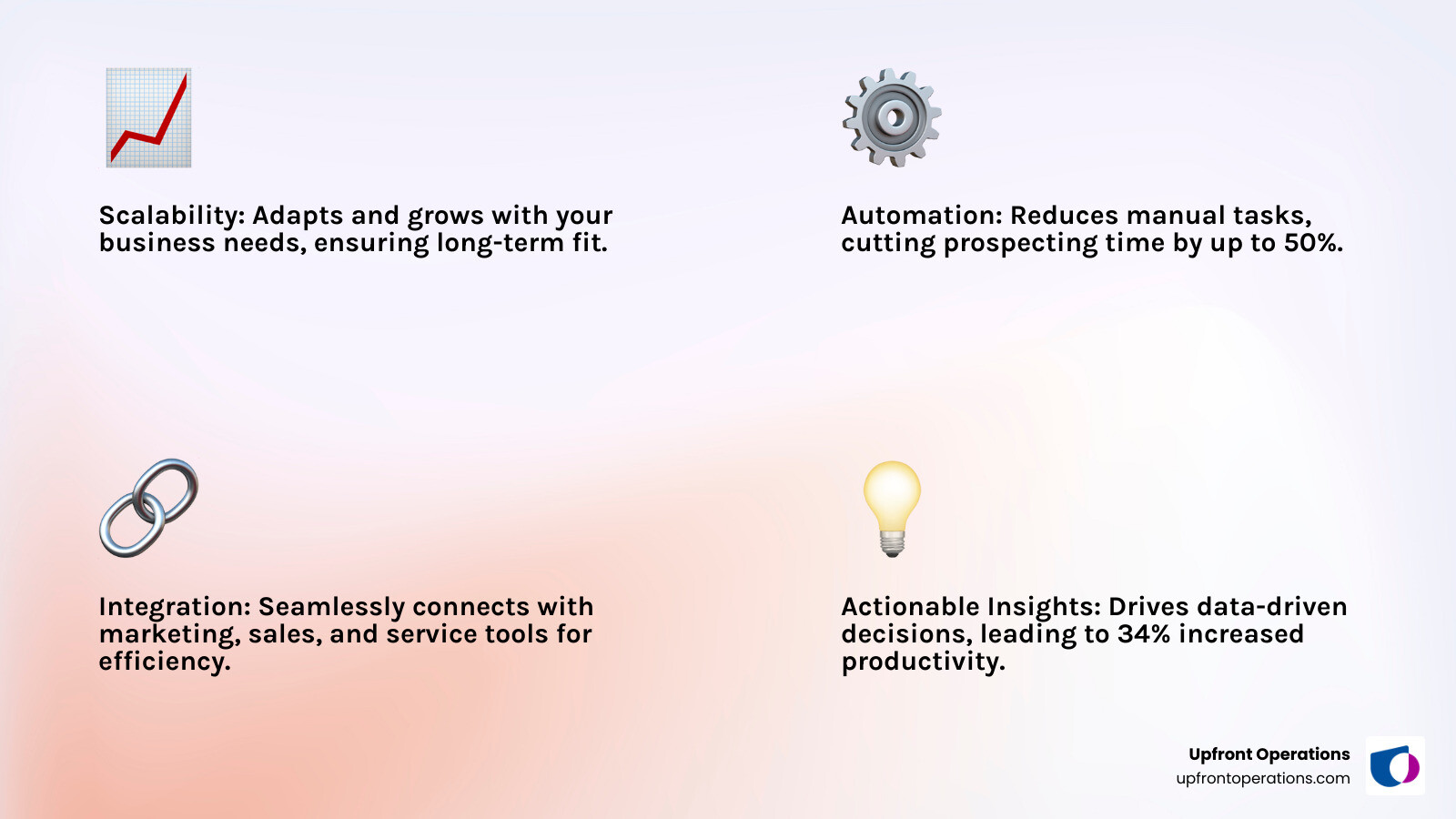CRM, Supercharged: How Growth-Focused Businesses Do More with Less
Do more with less! A Growth-focused CRM transforms your operations. Master scalability, automation & insights for rapid bu...
Do more with less! A Growth-focused CRM transforms your operations. Master scalability, automation & insights for rapid bu...

A Growth-focused CRM is more than a digital rolodex—it's a strategic approach that prioritizes revenue generation, scalability, and automation. These systems are designed to actively drive business expansion through intelligent workflows, predictive insights, and seamless integrations. For foundational context on how CRMs work, see Customer relationship management.
Key components include:
The reality is stark: according to some studies, as many as 50% of CRM implementations fail, often because businesses treat them as static projects. Mid-sized companies drown in spreadsheets and watch leads slip through the cracks while teams burn out on manual data entry.
Properly implemented CRMs can increase sales productivity by 34%, yet many businesses struggle with rigid systems. The difference lies in choosing a CRM with growth as the primary objective.
I'm Ryan T. Murphy, and for 12 years, I've helped companies implement Growth-focused CRM strategies, shortening sales cycles by 28% and building scalable revenue systems. My experience with tools like Salesforce and HubSpot proves that the right approach turns scattered operations into predictable growth engines. Prefer an on-demand jumpstart? Upfront Operations offers microservices like Set Up Simple CRM System to get you live fast and ready to scale.

Juggling calls, spreadsheets, and sticky notes isn't a recipe for sustainable growth. A true growth partner lies in a CRM designed to do more with less. It's the beating heart of your revenue operations, built to evolve and expand with your ambitions.
A Growth-focused CRM goes beyond storing contact information; it's mission control for your customer relationships.
Our CRM Solutions for SMB and Advanced CRM Features expertise helps businesses build systems that teams actually want to use.
A Growth-focused CRM equips your sales team with features that accelerate deal closure.
We help businesses master these systems through our expertise in Salesforce Funnel Management and Contact Management Systems for Small Businesses.
For a Growth-focused CRM, automation is the engine that allows you to scale without proportionally scaling your headcount.
This level of automation boosts efficiency and creates consistent customer experiences. Our CRM Sales Automation expertise and on-demand service to Set Up HubSpot to Drive Sales help businesses harness automation's full potential.
Choosing a Growth-focused CRM is like picking a vehicle for a long road trip—the right one depends on your destination and how fast you want to get there. Whether you're a startup or a mid-sized company, there's a platform designed for your growth trajectory.
A great CRM grows with you without breaking the bank. Let's compare three heavyweights:
Here's a quick comparison:
| CRM Platform | Scalability | Ease of Use | Starting Price (approx. per user/month, billed annually) |
|---|---|---|---|
| HubSpot CRM | Excellent | High | Free / $18 (paid plans) |
| Salesforce | Excellent | Moderate | $25 (Essentials) |
| Zoho CRM | Very Good | Moderate | $18 (Standard) |
Matching your ambitions with your budget is key. For help maximizing your investment, our on-demand expertise in Salesforce Relationship Management can ensure you get the most value from your platform.
Your Growth-focused CRM should be the central hub of your business ecosystem, not an isolated island. Integration prevents data chaos and creates a single source of truth.
Robust API access is the backbone of this connectivity, allowing different software to communicate. This holistic approach is fundamental to Revenue Operations (RevOps). We help businesses achieve it with services like Integrate HubSpot with Salesforce and CRM Integration for RevOps strategies.
The best Growth-focused CRM fits your business's unique style. What works for a marketing agency may not work for a B2B manufacturer.
The right CRM feels like it was designed for how you work. For specialized guidance, such as understanding CRM in Brand Management, our on-demand expertise can help you make the right choice.
Implementing a Growth-focused CRM is like getting a high-performance car—proper setup, training, and maintenance are required to get it on the track. Getting your CRM running is just the start; the real magic is turning it into a revenue-generating machine.
Avoid the common pitfalls of a rushed implementation by following a clear blueprint.
For a headache-free start, our Set Up Simple CRM System service handles the heavy lifting. To empower your team, see our guide on CRM Training: Open up Your Team's Full Potential with These Expert Tips.
Running a CRM with bad data is like using an outdated map—frustrating and counterproductive. The numbers are stark: 31% of companies say poor data quality costs them at least 20% of their annual revenue. This isn't a minor inconvenience; it's money walking out the door.
Data hygiene is an ongoing commitment, not a one-time cleaning. It means consistently updating contact info, removing duplicates, and standardizing data entry.
Regular audits and deduplication are your best friends. Schedule them quarterly to catch issues before they multiply. Poor data quality creates a domino effect: marketing targets the wrong people, sales chases dead leads, and analytics become meaningless.
This is preventable. Our approach emphasizes data quality, as detailed in Why Adhering to CRM Best Practices is Critical for Business Success. If your data is a mess, our Fix CRM Data Quality Problems service can get you back on track, and our CRM Data Cleanup guide shows you how to keep it clean.
Your Growth-focused CRM is a garden that needs regular tending. These five practices will ensure it flourishes.
Following these practices transforms your CRM from a contact list into the strategic backbone of your growth. For more, check out our Best CRM Practices resource.
Choosing a CRM can be overwhelming. Here are concise answers to the most common questions we hear from business owners.
A standard CRM stores and organizes contacts. A Growth-focused CRM is an active revenue engine. It's built for scalability, deep automation, and seamless integration with your entire tech stack to proactively drive business expansion, not just manage existing data.
Startups need a CRM that is user-friendly, affordable, and scalable. Key features include a strong free or low-cost entry plan, core sales pipeline management, and the ability to add advanced features like marketing automation as the business grows. Solutions like HubSpot's free plan or NetHunt CRM are excellent starting points because they offer room to grow without a heavy upfront investment.
It is absolutely critical. Poor support and inadequate training are primary reasons for low user adoption, which causes most CRM failures. If your team can't get timely help or doesn't understand how to use the tool, they won't use it, wasting your investment. Prioritize vendors with robust support and consider professional training services to ensure your team is confident and empowered. We offer on-demand guidance with our CRM Training: Open up Your Team's Full Potential with These Expert Tips to help your team succeed.
Imagine your sales team closing deals more efficiently, marketing nurturing leads automatically, and your customer data working as hard as you do. This is the reality of a well-implemented Growth-focused CRM.
We've seen how prioritizing scalability, automation, and clean data transforms a CRM from a simple database into your business's operational backbone. It creates a single source of truth that drives smarter decisions and accelerates growth.
But even the best CRM is only as good as its implementation. Many businesses invest in powerful platforms only to be held back by poor data, low user adoption, or mismatched workflows.
This is where on-demand expertise makes all the difference. Instead of hiring expensive full-time specialists, you can access elite support exactly when you need it. At Upfront Operations, we provide simple, on-demand microservices to solve your biggest CRM challenges.
Your Growth-focused CRM is waiting to become the revenue engine you've always envisioned. The question isn't whether you can afford to get it right—it's whether you can afford not to. Learn more about our services and let us help you turn your CRM into your most powerful growth tool.